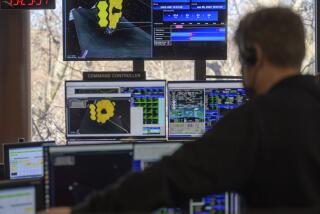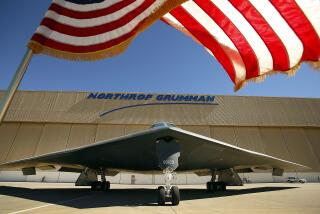Northrop’s Stealth Role Is Under Review : Rand Corp. Helping Pentagon Reassess Firm’s Sole-Source Position
- Share via
An assessment of whether Northrop should lose its position as the government’s sole-source contractor for the huge Stealth bomber program was under way Tuesday, as a team of Defense Department and Rand Corp. officials met with executives of Northrop and Rockwell International.
Under congressional pressure, the Pentagon is studying how competition can be created in the top-secret bomber program to reduce recent cost growth. Santa Monica-based Rand, working under a Pentagon contract, is examining several options for restructuring of the Northrop contract and is scheduled to meet with officials at Boeing and at LTV Corp.’s Vought unit later this week.
The consequences of a restructuring of the Stealth bomber program could be profound--financially for Northrop and economically for Southern California.
Northrop derives an estimated 50% of its sales from the Stealth, a proposed intercontinental nuclear bomber designed to elude detection by enemy radar with a variety of new technologies.
The bomber is under development at Northrop’s Pico Rivera and Palmdale facilities, which employ more than 12,000 people. Eventual full-scale production could easily double that employment level.
Rep. Les Aspin (D-Wis.), chairman of the House Armed Services Committee, is attempting to force the Pentagon to create some type of competition in the Stealth bomber program, which is nearing the point, possibly as early as next year, at which a decision must be made on whether to proceed with production.
Evidence that Northrop has encountered some type of technical problem, which would not be unusual in a new-technology weapon, has continued to mount in the past year. Public knowledge of the extent of such problems is limited by the secrecy surrounding the program.
After an exhaustive look at the Stealth program by the Armed Services Committee’s staff, Aspin said he had concerns about the growth of costs and advocated competition as one way to hold them down.
Northrop, based in Los Angeles, took a $124-million writeoff last month against profits on a program believed to be the Stealth bomber, following a similar $90-million writeoff last year, financial blows that were caused in part by cost growth in the program.
The intense scrutiny of the program appears to have prompted some action by Northrop, although a spokesman said Tuesday that he could make no comment on the matter.
Earlier this week, Northrop took steps to increase management attention on the Stealth bomber program when it named Marvin Elkin as deputy general manager at the Pico Rivera operation, formally known as the Advanced Systems Division.
Elkin, whose background is in such areas as pricing and subcontracting, was described by Northrop as “one of the company’s most experienced business executives.” It appeared to draw a distinction between Elkin and the division’s general manager, John Patierno, who was described as one of the firm’s “most proven technical managers.”
The action followed the disclosure by the Air Force last month that Northrop has failed to obtain formal Air Force approval of the Stealth division’s purchasing system after more than 2 1/2 years of trying.
“They are bringing in a guy like Elkin either to appease the customer (the Air Force) or because the guy has the skill to bring the program back on track,” one knowledgeable source said. “With the trouble Northrop is in, they have got to be worried.”
The threat of competition is one certain source of worry for Northrop. The fiscal 1988 defense authorization bill, which has yet to be passed into law, contains language mandating that the Air Force create a Stealth competition in one of three ways.
One option provided for a second contractor to review Northrop’s efficiency; a second option would involve holding a winner-take-all competition for the role of final assembly of the aircraft, and the third possibility called for a second production source for the bomber.
The selection of Rand to conduct the assessment study was made under its role as the “National Defense Research Institute,” according to Rand Vice President Michael Rich.
In past research reports, Rand has been less than wholehearted in its endorsement of competition in defense procurement.
More to Read
Inside the business of entertainment
The Wide Shot brings you news, analysis and insights on everything from streaming wars to production — and what it all means for the future.
You may occasionally receive promotional content from the Los Angeles Times.











